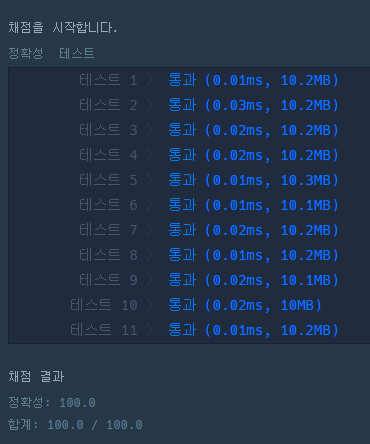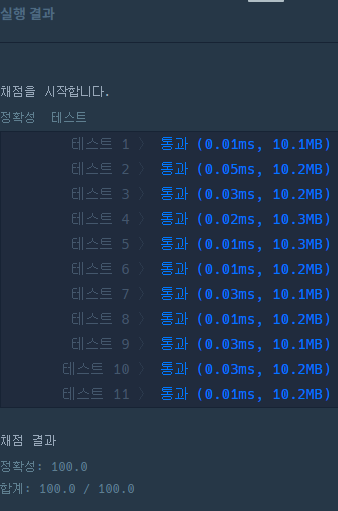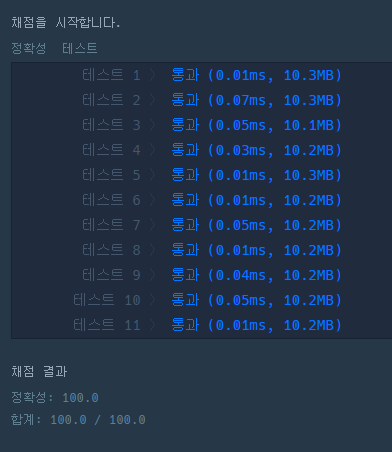| [프로그래머스, python3] 기능개발 | |
| 난이도 | Level 2 |
| 분류 | 스택/큐 |
| programmers.co.kr/learn/courses/30/lessons/42586 | |
문제 설명
프로그래머스 팀에서는 기능 개선 작업을 수행 중입니다. 각 기능은 진도가 100%일 때 서비스에 반영할 수 있습니다.
또, 각 기능의 개발속도는 모두 다르기 때문에 뒤에 있는 기능이 앞에 있는 기능보다 먼저 개발될 수 있고, 이때 뒤에 있는 기능은 앞에 있는 기능이 배포될 때 함께 배포됩니다.
먼저 배포되어야 하는 순서대로 작업의 진도가 적힌 정수 배열 progresses와 각 작업의 개발 속도가 적힌 정수 배열 speeds가 주어질 때 각 배포마다 몇 개의 기능이 배포되는지를 return 하도록 solution 함수를 완성하세요.
제한 사항
- 작업의 개수(progresses, speeds배열의 길이)는 100개 이하입니다.
- 작업 진도는 100 미만의 자연수입니다.
- 작업 속도는 100 이하의 자연수입니다.
- 배포는 하루에 한 번만 할 수 있으며, 하루의 끝에 이루어진다고 가정합니다. 예를 들어 진도율이 95%인 작업의 개발 속도가 하루에 4%라면 배포는 2일 뒤에 이루어집니다.
입출력 예
| progresses | speeds | return |
| [93, 30, 55] | [1, 30, 5] | [4, 3, 1, 1, 0] |
| [95, 90, 99, 99, 80, 99] | [1, 1, 1, 1, 1, 1] | [1, 3, 2] |
입출력 예 설명
- 입출력 예 #1
첫 번째 기능은 93% 완료되어 있고 하루에 1%씩 작업이 가능하므로 7일간 작업 후 배포가 가능합니다.
두 번째 기능은 30%가 완료되어 있고 하루에 30%씩 작업이 가능하므로 3일간 작업 후 배포가 가능합니다. 하지만 이전 첫 번째 기능이 아직 완성된 상태가 아니기 때문에 첫 번째 기능이 배포되는 7일째 배포됩니다.
세 번째 기능은 55%가 완료되어 있고 하루에 5%씩 작업이 가능하므로 9일간 작업 후 배포가 가능합니다. 따라서 7일째에 2개의 기능, 9일째에 1개의 기능이 배포됩니다.
- 입출력 예 #2
모든 기능이 하루에 1%씩 작업이 가능하므로, 작업이 끝나기까지 남은 일수는 각각 5일, 10일, 1일, 1일, 20일, 1일입니다. 어떤 기능이 먼저 완성되었더라도 앞에 있는 모든 기능이 완성되지 않으면 배포가 불가능합니다. 따라서 5일째에 1개의 기능, 10일째에 3개의 기능, 20일째에 2개의 기능이 배포됩니다.
소스코드
풀이1:
- 남은 일 수를 미리 계산하여 time 변수에 저장. 이 과정 속에서 math의 ceil 함수를 쓰지 않고, "-((p-100)//s)"으로 올림 계산 수행. (올림 계산을 하기위해 음수로 바꿔서 // 수행)
- 단일 for문 만으로 문제를 해결하기 때문에 (O(n)) 의 시간복잡도를 갖는다.
|
1
2
3
4
5
6
7
8
9
10
11
12
13
14
15
16
|
def solution(progresses, speeds):
answer = []
pre_idx = 0
# 남은 일수를 미리 계산
time = [-((p-100)//s) for p,s in zip(progresses, speeds)]
for curr_idx in range(1, len(time)):
# 순차적으로 남은 일수를 비교하여 동시에 배포되는 기능의 수를 계산한다.
if time[pre_idx] < time[curr_idx]:
answer.append(curr_idx - pre_idx)
pre_idx = curr_idx
# 나머지 계산
answer.append(len(time)-pre_idx)
return answer
|

풀이2: Queue
- 남은 일 수를 미리 계산하여 time 변수에 저장. 이 과정 속에서 math의 ceil 함수를 쓰지 않고, "-((p-100)//s)"으로 올림 계산 수행. (올림 계산을 하기위해 음수로 바꿔서 // 수행)
- Queue에 입력된 데이터로부터 동시 배포가 끝날때까지 Queue에는 추가 데이터가 들어가지 않고, 동시 배포되는 숫자를 카운트한다. 더이상 동시 배포가 이루어지지 않는다면 그 다음 데이터를 Queue에 넣고 똑같이 진행한다.
|
1
2
3
4
5
6
7
8
9
10
|
def solution(progresses, speeds):
Q=[]
times = [-((p - 100) // s) for p, s in zip(progresses, speeds)]
for time in times:
if len(Q)==0 or Q[-1][0] < time:
Q.append([time,1])
else:
Q[-1][1]+=1
return [q[1] for q in Q]
|

풀이3: Queue
- 남은 일 수를 미리 계산하여 time 변수에 저장. 이 과정 속에서 math의 ceil 함수를 쓰지 않고, "-((p-100)//s)"으로 올림 계산 수행. (올림 계산을 하기위해 음수로 바꿔서 // 수행)
- Queue는 데이터가 입력되면 입력되는 순서대로 쌓이고, 먼저 들어온 것부터 먼저 사용되는 FIFO(First-In First Out) 구조이다.
- append와 pop을 사용하여 queue의 형태를 따른 문제를 해결.
- queue에 계산된 남은 일수를 순서대로 append 시키고, 먼저 들어온 것부터 pop을 하여 다음 순번 데이터와 비교한다.
|
1
2
3
4
5
6
7
8
9
10
11
12
13
14
15
16
17
18
|
def solution(progresses, speeds):
# 남은 일수를 미리 계산
answer = []
Q = []
[Q.append(([-((p - 100) // s),1])) for p, s in zip(progresses, speeds)]
Q_value = Q.pop(0) # [time, cnt]
while Q:
# 동시 배포가 불가능할때, append(cnt)
if Q_value[0] < Q[0][0]:
answer.append(Q_value[1])
Q_value = Q.pop(0) # [time, cnt]
else: # 동시 배포가 가능할 때, cnt += 1
Q_value[1] += 1
Q.pop(0)
answer.append(Q_value[1])
return answer
|

분석
|
1
2
3
4
5
6
7
8
9
10
11
12
13
14
15
16
17
18
19
20
21
22
23
24
25
26
27
28
29
30
31
32
33
34
35
36
37
38
39
40
41
42
43
44
45
46
47
48
49
50
51
52
53
54
55
56
57
58
59
60
61
62
63
64
65
66
67
68
69
70
71
72
73
74
75
76
77
78
79
80
81
82
83
84
85
86
87
88
89
90
91
92
93
94
95
96
97
98
99
100
101
102
103
104
105
106
107
108
|
def solution(progresses, speeds):
answer = []
pre_idx = 0
# 남은 일수를 미리 계산
time = [-((p - 100) // s) for p, s in zip(progresses, speeds)]
print(f"time : {time}")
for curr_idx in range(1, len(time)):
# 순차적으로 남은 일수를 비교하여 동시에 배포되는 기능의 수를 계산한다.
print(f"<for {curr_idx}> time[pre_idx]: {time[pre_idx]}({pre_idx}) < time[curr_idx]:{time[curr_idx]}({curr_idx}) ")
if time[pre_idx] < time[curr_idx]:
answer.append(curr_idx - pre_idx)
pre_idx = curr_idx
answer.append(len(progresses) - pre_idx)
return answer
def solution_queue(progresses, speeds):
Q=[] # FIFO
# 남은 일수를 미리 계산
times = [-((p - 100) // s) for p, s in zip(progresses, speeds)]
print(f"times : {times}")
print(f"Q -> {Q}")
for time in times:
# Queue의 -1값과 현재 time값을 비교하여 동시 배포가 가능한지 체크
# Queue가 비어있거나 또는 동시 배포가 가능하지 않을 때,
if len(Q)==0 or Q[-1][0] < time:
Q.append([time,1])
else: # 동시 배포가 가능할 때,
Q[-1][1]+=1
print("time -> %2d, Q -> %s"%(time,Q))
return [q[1] for q in Q]
if __name__ == "__main__":
print('-' * 40)
progresses = [[93, 30, 55],[95, 90, 99, 99, 80, 99]]
speeds = [[1, 30, 5] ,[1, 1, 1, 1, 1, 1]]
correct_answer = [[2,1],[1,3,2]]
print("<<<<< def solution >>>>>")
for i in range(len(progresses)):
print(f"<<<<< case {i} >>>>>")
answer = solution(progresses[i], speeds[i])
print('answer :' , answer, '/ correct_answer :' , correct_answer[i])
if correct_answer[i] == answer:
print(f'테스트 {i}를 통과하였습니다.')
else:
print(f'테스트 {i}를 통과하지 못했습니다.')
print('-' * 40)
print("<<<<< def solution_queue >>>>> ")
for i in range(len(progresses)):
print(f"<<<<< case {i} >>>>>")
answer = solution_queue(progresses[i],speeds[i])
print('answer :' , answer, '/ correct_answer :' , correct_answer[i])
if correct_answer[i] == answer:
print(f'테스트 {i}를 통과하였습니다.')
else:
print(f'테스트 {i}를 통과하지 못했습니다.')
print('-' * 40)
----------------------------------------
<<<<< def solution >>>>>
<<<<< case 0 >>>>>
time : [7, 3, 9]
<for 1> time[pre_idx]: 7(0) < time[curr_idx]:3(1)
<for 2> time[pre_idx]: 7(0) < time[curr_idx]:9(2)
answer : [2, 1] / correct_answer : [2, 1]
테스트 0를 통과하였습니다.
----------------------------------------
<<<<< case 1 >>>>>
time : [5, 10, 1, 1, 20, 1]
<for 1> time[pre_idx]: 5(0) < time[curr_idx]:10(1)
<for 2> time[pre_idx]: 10(1) < time[curr_idx]:1(2)
<for 3> time[pre_idx]: 10(1) < time[curr_idx]:1(3)
<for 4> time[pre_idx]: 10(1) < time[curr_idx]:20(4)
<for 5> time[pre_idx]: 20(4) < time[curr_idx]:1(5)
answer : [1, 3, 2] / correct_answer : [1, 3, 2]
테스트 1를 통과하였습니다.
----------------------------------------
<<<<< def solution_queue >>>>>
<<<<< case 0 >>>>>
times : [7, 3, 9]
Q -> []
time -> 7, Q -> [[7, 1]]
time -> 3, Q -> [[7, 2]]
time -> 9, Q -> [[7, 2], [9, 1]]
answer : [2, 1] / correct_answer : [2, 1]
테스트 0를 통과하였습니다.
----------------------------------------
<<<<< case 1 >>>>>
times : [5, 10, 1, 1, 20, 1]
Q -> []
time -> 5, Q -> [[5, 1]]
time -> 10, Q -> [[5, 1], [10, 1]]
time -> 1, Q -> [[5, 1], [10, 2]]
time -> 1, Q -> [[5, 1], [10, 3]]
time -> 20, Q -> [[5, 1], [10, 3], [20, 1]]
time -> 1, Q -> [[5, 1], [10, 3], [20, 2]]
answer : [1, 3, 2] / correct_answer : [1, 3, 2]
테스트 1를 통과하였습니다.
----------------------------------------
Process finished with exit code 0
|
'프로그래머스' 카테고리의 다른 글
| [프로그래머스, c++] 여행경로(DFS) (0) | 2021.03.28 |
|---|---|
| [프로그래머스, c++] 타겟넘버(DFS) (0) | 2021.03.27 |
| [프로그래머스, python3] 주식가격(이중 for문, Stack) (2) | 2021.01.13 |
| [프로그래머스, python3] H-Index (sorted) (0) | 2021.01.10 |
| [프로그래머스, python3] 가장 큰 수(sorted, cmp_to_key ) (0) | 2021.01.03 |